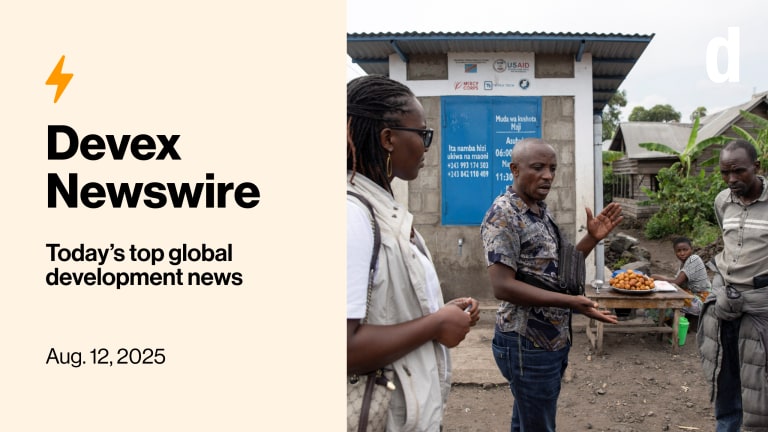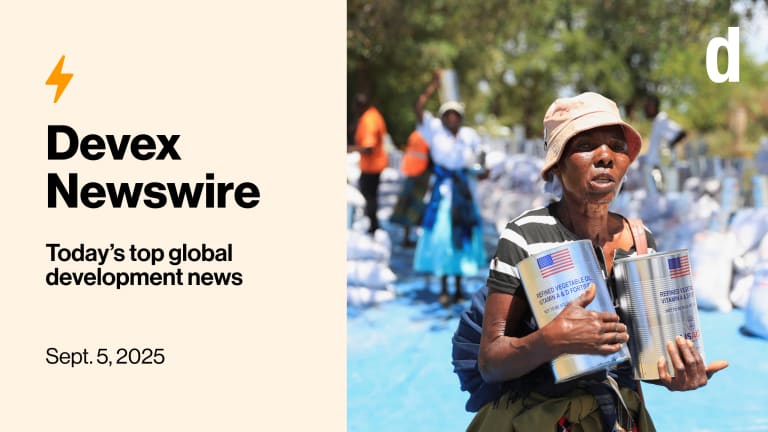
Thousands of global aid programs are expected to be slashed in the most sweeping foreign assistance shake-ups in U.S. history. Leaked spreadsheets whose contents we have dissected reveal what’s expected to stay, what’s gone, and the staggering dollar amounts behind it.
Also in today’s edition: Palestine makes a controversial play to head the U.N. General Assembly, and how foreign aid cuts have impacted the Ebola fight.
Who’s in, who’s out
This is a preview of Newswire
Sign up to this newsletter for an inside look at the biggest stories in global development, in your inbox daily.
The Trump administration went scorched-earth on global aid — and said it has terminated 86% of its global programs in a sweeping foreign aid overhaul. That’s 5,341 programs, worth $75.9 billion, wiped out in a two-month effort to push USAID under tighter State Department control. However, billions have also been preserved, so monetarily speaking, it’s a nuanced picture. My colleagues Elissa Miolene, Sara Jerving, and Adva Saldinger waded through hundreds of data points to distill the big picture for you.
That’s all according to a 281-page spreadsheet that lists terminated and active USAID programs that were sent to the U.S. Congress this week — first reported by The New York Times. These cuts were also confirmed in memos sent to Congress. Our data team crunched the exact numbers and they are jaw-dropping. Gavi, the Vaccine Alliance? Some $2.63 billion worth of contracts slated for cancellation. The World Health Organization’s polio and immunization work? A $1 billion award expected to be slashed.
But Dr. Sania Nishtar, the chief executive officer of Gavi, tells Sara that the organization has not received a termination notice from the U.S. government, and Congress had approved $300 million for the organization’s activities this year.
“A cut in Gavi’s funding from the US would have a disastrous impact on global health security, potentially resulting in the deaths of over a million children over five years, and endangering lives everywhere from dangerous disease outbreaks,” she says.
Also on the chopping block:
• $1.3 billion for global education via the World Bank.
• More than 80 United Nations programs, including those at UNAIDS, UN Refugee Agency, and the Food and Agriculture Organization.
• Two grants to the Anova Health Institute, a South African NGO that is the largest non-U.S.-based implementer for the U.S. President's Emergency Plan for AIDS Relief.
Some funds had already been committed, others hadn’t — but either way, they’re expected to be slashed.
What’s still standing?
• $1.3 billion to FHI 360 for HIV epidemic control.
• $7.4 billion for U.N. agencies, mostly to the World Food Programme.
• $7.6 billion for Chemonics’ HIV supply chain project.
• $13.4 billion for the Global Fund to Fight AIDS, Tuberculosis and Malaria, although that is from 2017-2027, all of which has already been obligated.
• One surprise survivor? A $1,500 contract for internet access for Madagascar’s financial intelligence unit.
The message is clear: This isn’t just belt-tightening — it’s a total foreign aid reboot.
Read: The USAID awards the Trump administration killed — and kept
Contract killers
In a complementary article, we delve into the 20 major U.S. contractors that each lost over $100 million in planned but undelivered funding, offering the clearest picture yet of how deeply the U.S. foreign aid freeze has disrupted the global development industry. That includes Chemonics, DAI, Cadmus, Deloitte, DT Global, Palladium, and many more.
As my colleague Raquel Alcega puts it: Together, these 20 contractors account for more than $9 billion in retracted USAID funding. Some were in the middle of implementation. Others hadn’t yet launched. What they share is a common fate: being left in limbo, with canceled pipelines and no formal road map for reinstatement.
Read: Who lost the most? The 20 USAID contractors hit hardest (Pro)
+ Not yet a Devex Pro member? Start your 15-day free trial now to access the event as well as all our expert analyses, insider insights, funding data, and more. Check out all the exclusive content and events available to you.
Bonjour Mansour
Palestine just shook things up at the United Nations. Its permanent observer to the U.N., Riyad Mansour, is running for president of the U.N. General Assembly in the 2026-2027 session, backed by all 22 Arab countries. The catch? Palestine isn’t a full U.N. member — and the U.S. will not be thrilled.
The role rotates by region, and it’s Asia-Pacific’s turn. With Bangladesh and Cyprus stepping aside, Mansour might run unopposed, writes Devex Senior Global Reporter Colum Lynch. The Arab Group delayed nominating him earlier this year to avoid angering Washington. But after Israel’s renewed offensive in Gaza, support rallied.
There’s a big legal snag: U.S. law cuts funding to U.N. bodies that recognize Palestine as a state. In 2024, the U.N. General Assembly expanded Palestine’s rights — but the U.S. blocked full membership.
Former U.S. envoy Robert Wood didn’t mince words and questioned whether Palestine has the legal status to serve as U.N. General Assembly president. “Why they are doing it, I don’t know,” Wood said. “They may be trying to get this administration to respond in some way. That is not advisable.”
Meanwhile, incoming U.S. Ambassador to the U.N. Elise Stefanik calls the U.N. a “den of antisemitism.”
Another diplomat warns: “We have seen this on numerous occasions, the Palestinians take steps they believe are going to win them support ... and it continually backfires.”
The legal question of Palestine’s eligibility to run for U.N. General Assembly president remains unresolved, but Secretary-General António Guterres interpreted a May 2024 resolution to mean that while Palestine cannot vote, its delegate “may be elected as President.”
U.N. officials are rattled. One simply texts: 🤯.
Exclusive: Palestinians launch bid for UN General Assembly presidency
Outbreak of chaos
“None of the Ebola activities had been approved.” That’s the blunt takeaway from Nicholas Enrich, a longtime USAID global health leader, testifying before Congress on how the Trump administration fumbled its response to Uganda’s Ebola outbreak.
In a story that includes stranded personal protective equipment, blocked payments, and threats of being fired, Enrich described a chaotic breakdown. “Our complete inability to implement lifesaving activities was the result of a series of intentional actions and obstructions taken by the Trump Administration about which the public has been misled,” he told lawmakers.
The Ebola outbreak in Uganda began in January, and there are now 12 confirmed cases and two deaths. USAID's response? Gutted. From 783 global health staff, only about 67 remained after sweeping terminations.
Enrich, placed on leave after raising internal alarms, said that despite public claims from Elon Musk that Ebola programs were “accidentally canceled very briefly,” the reality was, “None of the activities were approved, and no funds had been made available for any Ebola response activities.”
Read: Ousted USAID health lead says US fumbled Uganda’s Ebola response
+ For the latest insider reporting on global health, be sure to sign up to Devex CheckUp, a free, Thursday newsletter — and get today’s edition in your inbox soon.
News feed
Today marks the official start of the Nutrition for Growth, or N4G, summit in Paris. It’s a two-day pledging conference that aims to garner political and financial commitments toward ending malnutrition, organized by the most recent Olympic Games host.
While attendees tell Devex Senior Editor Tania Karas they’re doubtful N4G will be able to reach the $27 billion raised at the previous summit held in Tokyo in 2021, organizers and nutrition advocates have been trying to drum up support for months — particularly from philanthropy, multilateral development banks, and the private sector.
The stakes are high: At least 14 million children will face disruptions to nutrition services due to the recent and expected funding cuts, leaving them at risk of severe malnutrition and death, according to UNICEF data. A study published yesterday in the Nature journal projects an additional 369,000 child deaths per year due to the aid cuts — with 163,500 linked to U.S. aid reductions alone.
Read: Nutrition for Growth faces funding headwinds
Background: This French diplomat thinks nutrition is a ‘magic wand’ for development (Pro)
+ Got a tip for Tania? Get in touch at tania.karas@devex.com.
Spring forward
The U.K. government has released its Spring Statement economic update, which offers new details about the planned reduction in the aid budget. Rather than staying at 0.5% of gross national income before 2027, the budget will be gradually reduced starting this year, first to 0.48% of GNI, then to 0.34%, then finally to 0.3%. This will fund what Chancellor Rachel Reeves calls “The biggest sustained increase in defence spending since the end of the Cold War.“
CARE International’s CEO Helen McEachern responded in a statement that, “The 2021 cuts to UK aid — justified by the previous government as ‘temporary’ — have been exacerbated and cemented by Labour. This amounts to more than just a broken manifesto pledge, it undermines Britain’s standing in the world, global health, peace and security. And make no mistake: it will be deadly.”
ICYMI: Former UK development minister ‘absolutely horrified’ by foreign aid cut
+ Join us on April 2 for a conversation with Simon Meier, the head of BII Plus at British International Investment to better understand how to engage with the U.K.’s development finance institution and the opportunities that technical assistance can offer. Register now.
In other news
Norway’s foreign ministry announced the temporary closure of its embassy in Juba, South Sudan, citing worsening security. [Reuters]
Ministers from 40 countries met in Berlin, Germany, for the 2025 Petersberg Climate Dialogue, urging decisive action on renewables and climate commitments ahead of the Paris Agreement’s 10th anniversary. [UN News]
Australia will allocate a record 75% of its foreign aid to the Indo-Pacific region as U.S. cuts force a regional shift, with total aid rising to AU$5.097 billion ($3.22 billion). [AP]
Update, March 27, 2025: This article has been updated to include additional details about funding that was spared from aid cuts.
Sign up to Newswire for an inside look at the biggest stories in global development.








